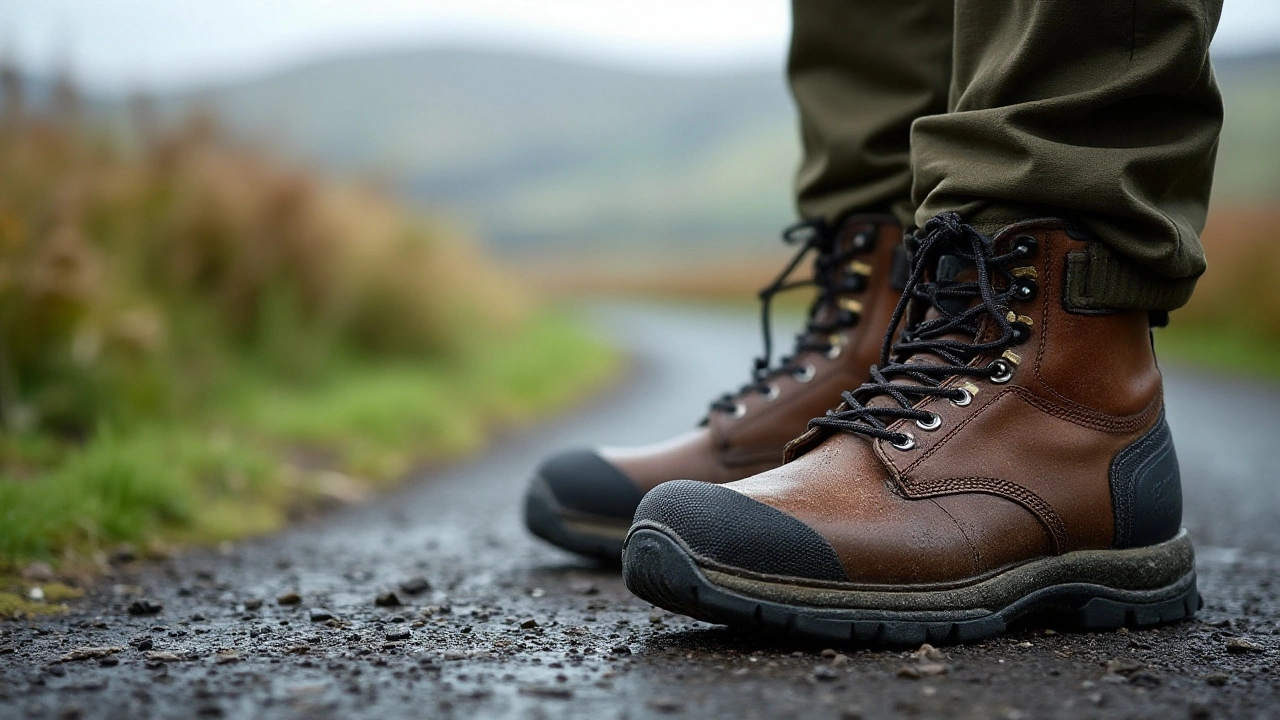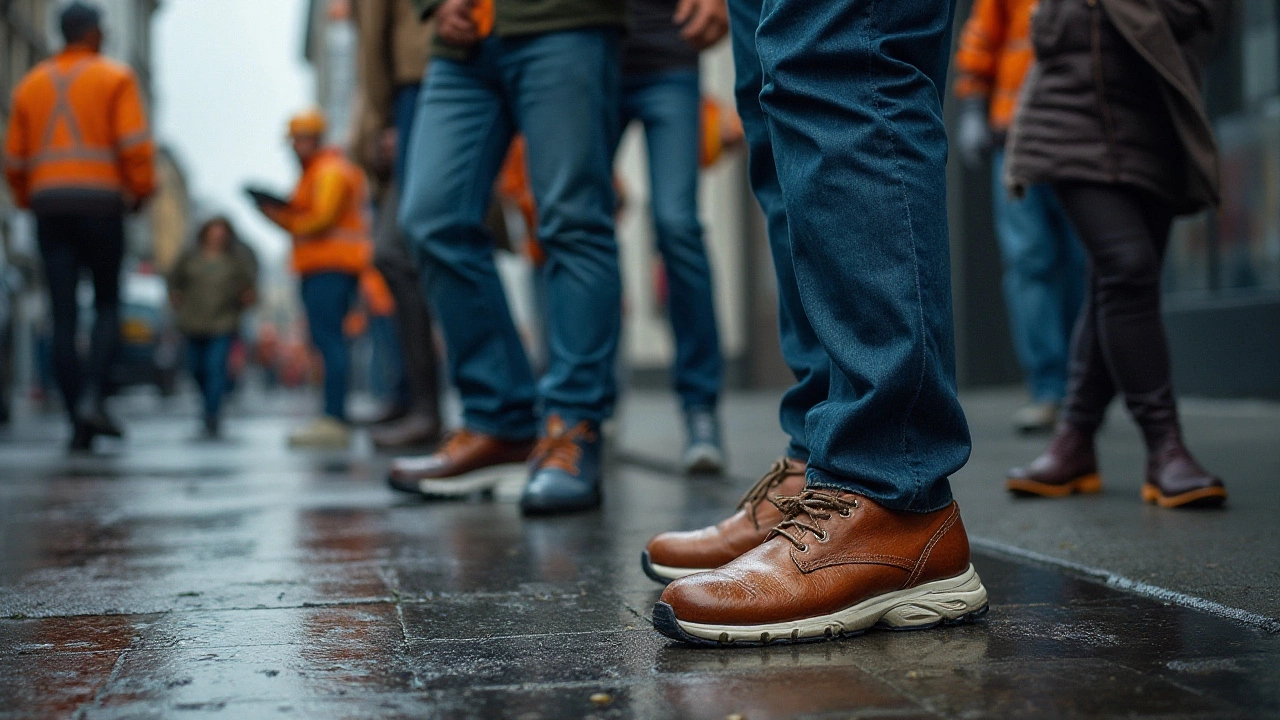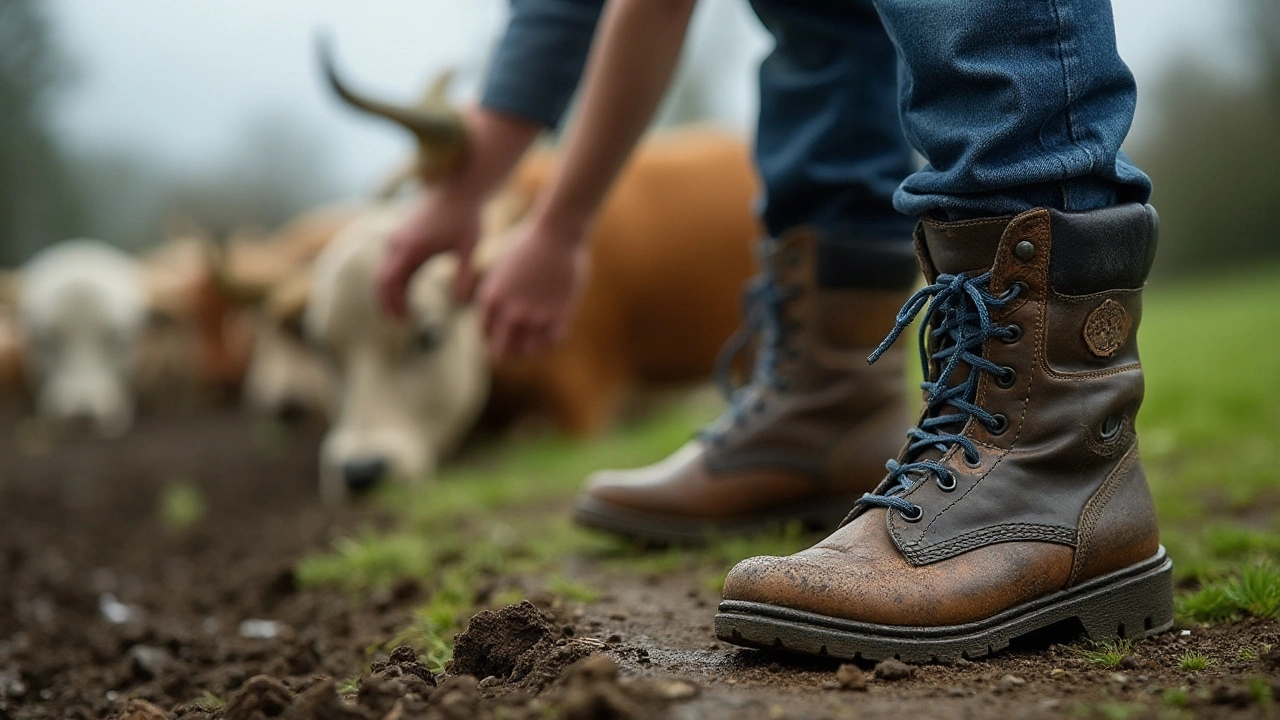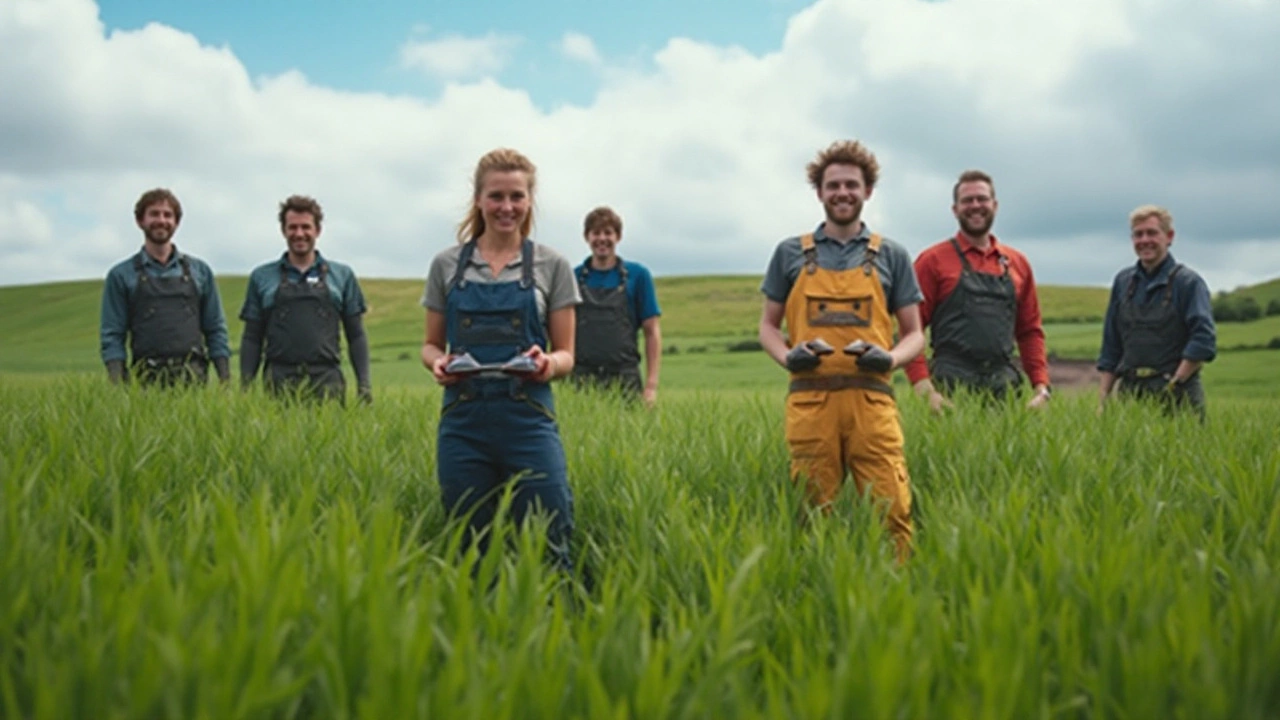In the realm of work attire here in Ireland, the choice of footwear can often make or break your day. Shoes are not just about style; they’re about providing the support, safety, and comfort that every hard-working individual needs. In Ireland, where rain can be a regular companion, selecting the right pair of work shoes isn’t just about looking smart; it’s about staying upright on slippery pavements and ensuring your feet remain dry and safe.
The significance of a reliable pair of work shoes cannot be overstated. There’s more to them than meets the eye – from intricate safety features built for our diverse job environments to materials designed to withstand Irish weather extremes. Let’s delve into what makes a trustworthy work shoe choice for anyone who’s building, fixing, or creating day in and day out on this side of the world.
- Key Features of Work Shoes
- Weather Considerations in Ireland
- Local and International Brands
- Tips for Choosing the Right Shoe
Key Features of Work Shoes
When considering the essential features of work shoes within the Irish context, it's vital to focus on practicality alongside protection. Ireland's labor market demands shoes that are not only functional but resilient to the varying conditions workers might face day-to-day. The first critical feature is durability. A reliable work shoe must be constructed from high-quality materials designed to endure significant wear and tear, as workers from Dublin to Cork will attest. Leather and high-grade synthetic materials often offer the best longevity, perfect for those gruelling shifts on construction sites or factory floors.
Comfort comes hand-in-hand with durability. Long days demand shoes that provide cushioning for the feet, reducing fatigue whether you're standing, walking, or lifting. Insoles that offer ample arch support and breathable linings can prevent the usual sweaty discomfort, a common concern under Ireland’s erratic weather conditions. This brings us to weather adaptability, an often overlooked but crucial element. Considering the country's reputation for rain, ensuring your shoes are water-resistant or waterproof is key to keep those feet warm and dry, especially during the endless downpours of a typical Irish winter.
A representative from a leading footwear brand once noted, "Shoes aren’t just about walking; they're about protection and empowerment." This sentiment holds particularly true in safety features. Irish regulations may require steel toe caps in certain areas, which provide indispensable protection against heavy objects. Non-slip soles are another must-have, especially given the wet and sometimes icy conditions, helping prevent workplace accidents. It’s worth noting that some industries, such as electrical fields, require shoes with specific insulation properties.
Another integral feature is support for the distinct wear and tear of your job. Padded ankle collars prevent chafing, while reinforced heels offer stability for those requiring extra grip. Meanwhile, ventilated mesh panels allow feet to breathe, curbing overheating and bacterial build-up. You may also find shoes equipped with reflective materials pretty useful, especially for those operating in low-visibility environments or engaging in night-shift work. Reflective strips can serve as an additional safety measure, increasing visibility to co-workers and machinery.
To break down these essential features, it might help to consult a straightforward table summarizing top characteristics:
| Feature | Benefit |
|---|---|
| Durability | Lasting use in tough conditions |
| Comfort | Prevents fatigue and discomfort |
| Weather Adaptability | Survives Ireland’s wet climate |
| Safety Features | Protection from accidents and hazards |
| Supportive Design | Maintains feet health over long shifts |
When all these factors are considered, selecting the right work shoes becomes more than just a necessity—it's an investment in one's well-being and efficiency on the job. The Irish workforce, known for its resilience and adaptability, deserves nothing less than footwear that mirrors these traits and delivers consistent performance day after day.

Weather Considerations in Ireland
The emerald isle is well-known for its lush landscapes, but with such beauty comes the daunting regularity of weather changes that can happen at a moment’s notice. In Ireland, selecting the right work shoes necessitates preparing for an environment where rain is almost a frequent guest. On average, Ireland experiences rain on just over half the days of the year. Given this climate, waterproof or water-resistant footwear becomes less of a preference and more of a requirement for anyone stepping outdoors for their job. Investing in shoes with these qualities ensures not just comfort, but helps to maintain safety by preventing slips and falls, a common risk during wet conditions.
Keeping Dry and Safe
It's not merely about staying dry; dry conditions underfoot mean safer walking and working conditions. Slip resistance is a crucial factor. Many Irish work shoes come equipped with specialized rubber soles designed to provide maximum traction on wet surfaces. This is particularly important in urban settings like Dublin, where slick pavements can catch anyone off guard. A common recommendation is to look for shoes labeled with an SRC rating, indicating excellent slip resistance on both tiles coated with a specific lubricant and on steel floors coated with glycerol, minimizing the risk of accidents, which is vital for those working in areas prone to spills or moisture.Weatherproofing Techniques
Innovations in footwear technology have introduced breathable membranes and moisture-wicking linings. These enhancements allow sweat to escape while preventing water from entering, cultivating a healthy microclimate inside the shoe. This is especially useful for those spending long hours in conditions where the Irish drizzle often turns into a persistent downpour. An added advantage of these technologies is reducing the risk of foot-related ailments caused by prolonged exposure to moisture, such as fungal infections or blisters, thereby ensuring workers stay comfortable and healthy throughout their shifts.According to Met Éireann, Ireland's national weather service, "The country is renowned for its variable weather, and workers on the island must always be equipped with gear to meet these challenges."Changing seasons impact shoe requirements too. In winter, insulating qualities and rugged about constructions become desirable, making tasks in areas like the Wicklow Mountains more bearable. On the other hand, during the warmer months, it is crucial to opt for shoes that allow ventilation to avoid overheating. As such, selecting shoes that adapt to these transitions can help maintain not just physical comfort but also occupational productivity and well-being.
Lastly, prioritising durability is a smart move for anyone purchasing work shoes in Ireland. Given the climate's relentless nature, shoes will endure wear and tear at an accelerated pace if they aren't built to withstand such conditions. Opting for renowned local and international brands known for quality and longevity could prove cost-effective and reliable over time, providing peace of mind through every squall and sunbeam alike.

Local and International Brands
When it comes to selecting the right work shoes in Ireland, both local and international brands offer an impressive range of options to suit every industry and personal preference. If you're navigating the bustling streets of Dublin or the wild terrains of Connemara, it's crucial to choose a pair of shoes that are not only protective but also comfortable and stylish. Among the local offerings, Dubarry, a company renowned for its waterproof boots, has been a staple in Irish footwear for decades. Known for their durability and ability to withstand Ireland’s unpredictable weather, Dubarry shoes have become synonymous with quality and reliability. While they began with country boots, their expansion into workwear has been met with appreciation from various industries, notably those involving outdoor labor.
Among international brands, Dr. Martens and Caterpillar are often popular due to their reputation for ruggedness. These brands focus heavily on safety features like steel toes and slip-resistant soles, which are essential in construction or warehouse settings. With international brands like these, technology often plays a significant role; incorporating materials and designs that cater to the toughness required by specific jobs, yet providing a level of comfort that makes them wearable for long hours. In a
quote from a prominent Irish safety expert, "Choosing the right brand can hugely impact your work safety, as not all shoes offer the same level of protection specific to your job's needs."
However, local craftsmanship should never be overlooked. Brands like O'Mahony, though smaller, offer customization options that are invaluable for specific needs. Many Irish shoemakers pride themselves on understanding the unique conditions faced by workers here, crafting shoes that are not just about enduring the elements but also providing a feel that resonates with the local culture. The choice between local and international often hinges on what aspect one prioritizes – global reputation or local insight – with both harboring significant pros.
Lastly, it's worth noting that technology and sustainability have begun to guide many brand decisions, local or international. For instance, KEEN, although primarily a hiking brand, with their expansive eco-friendly work line, has captured consumers who wish to align their purchasing with ecological values. This trend is increasingly relevant as Ireland continues to push towards greener initiatives across various sectors, spurring even traditional brands to innovate. When it booms down to purchasing a worker's shoe, the right brand could offer advancements like moisture-wicking linings or energy-return soles, enhancing both on-the-job performance and overall user satisfaction.

Tips for Choosing the Right Shoe
When searching for the perfect pair of work shoes, several factors must be considered, especially for professionals across Ireland. The first thing to look at is functionality. Depending on your industry, shoes may need to offer specific types of protection. For example, in construction, reinforced toe caps are crucial to ensure safety from heavy objects. Meanwhile, for those in hospitality or cleaning services, non-slip soles are key to navigating the often wet and slick surfaces found throughout Irish job sites. Consider, too, the Irish climate, which adds another layer of necessity for water-resistant materials. Imagine trekking through puddles or working outdoors for hours without the right gear; it's all about keeping your feet dry and comfortable.
Comfort is another paramount factor. A great pair of work shoes should support long hours on your feet. This is vital across professions, from nurses making rounds in hospitals to retail workers stationed on hard concrete floors. Look for shoes with good arch support and cushioning. It is not just about making it through the day without foot pain, it’s about maintaining health over time. Chronic discomfort could lead to more severe foot or joint problems in the future. Also, consider brands known for their ergonomic designs. Brands such as Clarks and Ecco often come up in discussions due to their focus on comfort.
"Wearing the right shoe today can make all the difference in your tomorrow," advises John Quill of Quill's Shoes, a long-established retailer in Cork.
Aesthetics should not be overlooked either. While safety and functionality are key, we should never underestimate the morale boost derived from wearing shoes that align with one’s personal style. Thankfully, many Irish market options don't sacrifice style for safety. Look for sleek designs that can double both on-site and in more formal environments. That way, those after-hours pub visits remain a casual affair without the need for an additional set of shoes.
Let’s not forget the reliability based on reputation. In Ireland, the word of mouth is a powerful chieftain of its own. Listening to colleagues’ recommendations can often lead to discovering high-quality choices that might not always appear in the spotlight. It’s not unusual to find that a boot or shoe, heralded among the farming communities in Tipperary, has spread thanks to shared advice more than any advertisement. This, combined with thorough research, can ensure your purchase is as informed as possible. When checking reviews, focus on durability and long-term satisfaction rather than initial impressions.
When making a purchase, always try on shoes later in the day. Feet tend to swell slightly after standing and walking, giving you a swifter idea of comfort during working hours. Opting for shoes slightly bigger than your regular size can often be the secret to maximum comfort. This allows space for warm, thermal socks – a useful consideration given our chilly Irish winters. Remember, finding the right safety footwear is about combining protection with delicacies of comfort. Style may be the icing on the cake, but practicality forms the layers beneath.
